A collection that matters: Clare Shaw's 'Flood'

About three years ago, Clare did something I find unnerving even now. She sent me the manuscript of the new collection she’d been putting together (it was provisionally called Floodtown) and asked me to give her (detailed) feedback on it. And yet when the new collection came out last year, it was very different from that early draft. Richer; artfully sequenced and structured. I read it, straight through, while I was waiting for a bone scan in the oncology department of St James Infirmary in Leeds ... waiting to be suffused, flooded, if you like, with molecular energies. I read it as a powerful narrative of survival and its celebration. It came with its own life-enhancing, optimistic energy and force.
In popular belief, we are 90% water; this is untrue … in fact, we’re about 65% water. We cannot live without it; we cannot breathe or live in it. The sea is where we came from, and we cannot quite leave it behind. The idea of flood is in our collective unconscious, a great cataclysmic flood that every culture recognises in its myths. Genesis, Gilgamesh, the Greek’s Deucalion. Flood as divine punishment, a great scourging and cleansing that spares only the pure in heart. The Australian Aboriginal Dreamtime reverses the idea in the story of Tiddalik the Frog who drinks up all the waters of the earth so that nothing can grow, and can only be got to release them by being made to laugh.
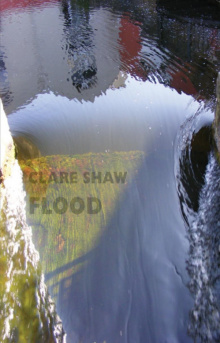
Clare first:
When I first heard her read to a less than full house at the Albert Poets in Huddersfield, I was bowled over. I’d been roped in to compering duties at the last minute; as far as I remember I described her set as a riveting combination of Patti Smith/Bukowski/ Dylan/ Morrissey and John Cooper Clarke, if they had that accent of the Lancashire Pennines where they rhyme ‘hair’ with ‘fur’. She reads with a rare intensity and poise; her poems have you unwaveringly in their sights. They’re felt and physical, urgent and full of love. And they demand to be heard.
She says in an interview: "I revel in the texture and echo of words; I love their dance. There’s something about the physicality of the spoken word that delights me. For me it feels like the meeting place of human and landscape; a sort of landscape of mouth and air and page. I enjoy the physicality of my own language; and I’m drawn to poems that foreground the dance and swoop of conversation, as well as the music of form and rhythm; alongside meaning and content."
In another interview she said: "I spent most of my twenties on Liverpool psychiatric wards and units. It was grim. Conditions were terrible, staff were often burnt out, disengaged or hostile. Those who weren’t were nonetheless generally stymied by a medical model of mental illness which stripped the personal and social meaning from our distress and reduced it to an issue of biology, medication and management.
"Life had been difficult; I was distressed when I entered the system; what I experienced there made it worse. When I see things that are wrong, I want to change them. I entered into campaigning as a matter of necessity. It’s a passion for me. And of course, I write.
"One of the reasons I ended up in mental health services is because I didn’t have the language for what I felt and what I needed. I tried to manage on my own; and I communicated my feelings and needs through my behaviour – through self-injury. Finding the right language has been a crucial part of my 'recovery'. Mental health calls for a language of nuance and extremity; which can hold intense, complex and sometimes contradictory emotion and experience. Poetry is where I found this language."
Let’s foreground some key words and phrases before we go any further
the texture and echo of words … their dance … the physicality of the spoken word … the dance and swoop … the music of form and rhythm … a language of nuance and extremity intense, complex and sometimes contradictory
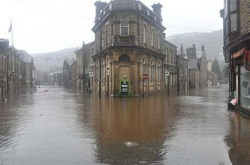
I can’t do justice to the complexity and richness of nearly 50 poems, so I’ll settle for sharing three poems from the collection, for trying to give you the quality and flavour three main threads or strands in Flood.
The first thread is the core story of the Calder Valley floods of 2015 which ruined Clare’s adopted home of Hebden Bridge; it has a role in reconciling her struggles with identity, it gave her a place to stand, and to be; she celebrates it in 'Who knows what it’s like':
I grew up outnumbered, one hundred to one /I found my own people. My kin.
(just in passing, I love the way she ends on a couplet with its near rhyme, the assonance of one / kin ). She gives thanks for that kinship in 'Measures of goodness', for:
Those swilling for others.
Those who form armies of buckets and brushes;
those bailing water from fast-filling cellars.
Those making cuppas for neighbours and strangers:
those who would see no one cold.
Just listen to the rhythm and dance she talked about in the interview, the dance that’s made by swilling /bailing/fast-filling/making and cuppas / armies / buckets / brushes / neighbours / strangers. It’s a rhythm that comes from speech, so it seems effortless for all its artfulness.
The second thread is that of the dark current of child and sexual abuse which she frames in the context of folk tales, of orphans and forests and wolfy predators, in poems like 'Grim', 'Who said' and 'Telling tales'. But notice how their darkness is set against the light and tenderness of poems about her mother and father and grandmother. It’s a beautifully organised/curated collection, Flood.
The third thread, that of survival, whether in psychiatric wards or in difficult relationships, uses flood and harsh weather as a metaphor for separation in poems that explore the difficulties of love, and the breakdown of a relationship, particularly in this poem where flood brings no cleansing or absolution, and where the width of a bed is impassable as a river in spate:
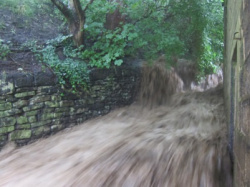
The weather’s all wrong
and nothing can right it. Wherever I am,
there’s a sound in the background
like threat. The wind knows
all of my secrets.
It hates that it cannot speak.
All night, it rages. The garden is battered,
the small path is lost to mud.
Slates have slipped. There’s damp in the bricks
and the floors are dirty.
No matter how high the heating,
I cannot get warm.
When I sleep, I dream in yellow;
sun pouring down me
like rain. Then I’m naked
and everything I touch is hot.
Sky glares; flowers are open.
Bushes are loaded with fruit. I’m a shit.
Morning. You’re on the bed’s far side.
The room smells of something hidden.
The river is angry with rain.
Roads are blocked and the lines are down.
I stretch out my arm
but can’t reach you. I cannot reach you at all.
In this breakdown of communication, all roads are blocked and the lines are down. There are no emergency services. Dreams of sun and warmth are yellow, and warmth is a feverish heat. Waking is awful. It’s a stunner of a poem. They stick in the mind, those moments that draw you in. The wind knows all your secrets.
Two more poems. The biblical flood is unavoidable, isn’t it? In this version though, the survival is that of the wife and mother, and the survival is that of her self. Mrs Noah can say at the end : this is my voice. And it’s been hard-won. (I should say in passing that I like the device of using the stages of developing flood, as described in a kind of Beaufort scale of inundation as titles for poems; I like the way that this one conflates and elides her personal story with the story of the valley, and its flood with those of myth.
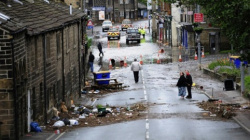
My man was not blameless but he knew his own mind.
He loved his sons, his God, his goats.
We were solid as wood, as steady as bread.
It was not perfect: it was what I had.
I brought up boys in a time of war.
I loved them. I had no choice.
And this is my voice:
you would not believe the violence;
how the ground was covered in minutes;
how quickly our valley was Nile.
When the river came with a sound like battle
and when all the waters were one
then we knew how angry we’d made him
and it was too late to run.
When I tell you I feared for my life
for my children – you cannot imagine.
When I say, I saw people drown,
they looked in my face and I could not help them –
ours was the only boat on that ocean;
a boat the size of a zoo, a mansion;
a sea the size of the world.
I lived to see what I loved destroyed
and all my world was unmade.
Forty days. The boredom and stink
and the darkness. No wonder
the birds pulled out their feathers
and the bear banged his head on the wall.
And when the rain stopped,
then the silence.
The mountains a dream in the waters beneath us.
I think, that day, there was sun.
When floods recede,
they don’t leave a world made shiny
and bright. For years, I’ll be cleaning up shit.
No bird nor branch can make this right.
No trick of the light. No I’ll-never-do-it
again. No god or man.
I loved him. I had no choice.
And this is my voice:
it takes more than a dove
and I will not forgive.
That note of defiance, truculence, even, sounds like a trumpet. It’s the voice of a survivor. Which brings us to the last poem I asked for. This featured in a previous post when Clare was the guest, but WordPress corrupted all the line breaks, and I wanted it in all its pristine glory.
I came back
to the sound of birds in the morning,
to heavy rain falling. Back to the holding of hands.
I came back from the storm
to shelter. Though they said
there was no way back
I came back in a taxi, by darkness
and no-one could see my face.
I came back from the brink,
from Broadoak. There was screaming
inside my ears. I came back running,
back from not speaking.
I made the same noise for years.
I came back by grafting, back
with my arms open wide and laughing.
I was brought back by daisies.
I was brought back by doctors.
Saved by a surplus of air
because somebody needed to breathe it;
I came back to the feeling of mud, I forgot
I forgot how to cross the road.
I was not brought back by love.
I was brought back by stone
and by falling. I was brought back
by hitting the floor. I was wrapped in a blanket,
brought back by hurting,
by the sight of my own insides
and I did not like it and I could not stop it
but back is the way I came.
I was brought back by words
though I didn’t believe them,
I came back to a yard in the sun.
I was brought back by pain that I could not escape.
When they stitched me, I could not run
I was sweating. I will never forget them.
I came back to my mother’s eyes
and the sound of the telly left on.
I came back the long way round
and I did not mind about distance.
I was brought back by violence, my own.
I came back for vodka, I came back for fire,
for your animal breath in my ear.
For the colour of leaves in the darkness.
I came back for your eyes in the darkness;
to houses that did not care.
For tracing the flames with my fingers,
how you parted my knees with your hands
and when the fires had all lost their voices
I came back from the page’s blank stare.
I was brought back to words: moon,
falling. I was right I was right all along.
I came back.
I lived through thunder.
And I did not come back for the sun.
Clare wrote this about it at the time:
“Gregory Orr’s book Poetry as Survival was a happy discovery I made recently after agreeing to tutor the Poetry School course. I won’t try to précis the book: suffice to say, it’s like someone cut me open and read what was inside me. Here are two line from it, which seem very relevant this month: “Trauma, either on an intimate or collective scale, has the power to annihilate the self and shred the web of meaning that support is existence. Yet the evidence of lyric poetry is equally clear – deep in the recesses of the human spirit, there is some instinct to rebuild the web of meanings with the same quiet determination we witness in the garden spider as it repairs the threads wind and weather have torn.” Here’s a poem which pretty much summarises how I feel. I wrote the first draft of it on the last day of NaPoWriMo 2015: and it’s a kind of thank you letter to Kim Moore and to all the other writers who brought me back. PS. I finished the collection today. Thanks.”
There you are. When you buy the book, please read 'I came back' and then 'I Woz here' just to savour the defiance it takes to survive, the resilience. And then go on to savour the dance and the images, the moments:
yes I saw the river rising / but I did not see this coming
the river is a story / that can’t be believed
nobody intended this story / but I have written it on my arms
And then finish with this one
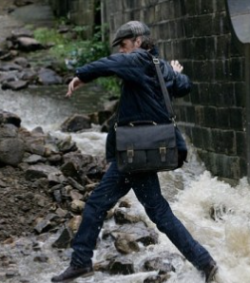
Look.
It has stopped.
You lifted your sea on blocks.
You saved some stock.
You did whatever you could.
You worked hard. Your daughter was never afraid.
Now look.
The sun has come back,
hedges are heavy with light.
Fields shine
and though sheep are still waiting
for rescue,
they will be saved.
As will you.
If I were to devise a coat of arms for Clare Shaw, the motto would not be in Latin. It would be that line from Larkin. What will survive of us is love.
Check out earlier posts featuring Clare Shaw via these links. Oh, and buy all her books
https://johnfogginpoetry.com/2017/06/11/what-survives-and-a-gem-revisited-clare-shaw/
https://johnfogginpoetry.com/2015/05/24/not-believing-in-silence-a-polished-gem-4-clare-shaw/
Straight ahead, Bloodaxe 2006, £7.95




